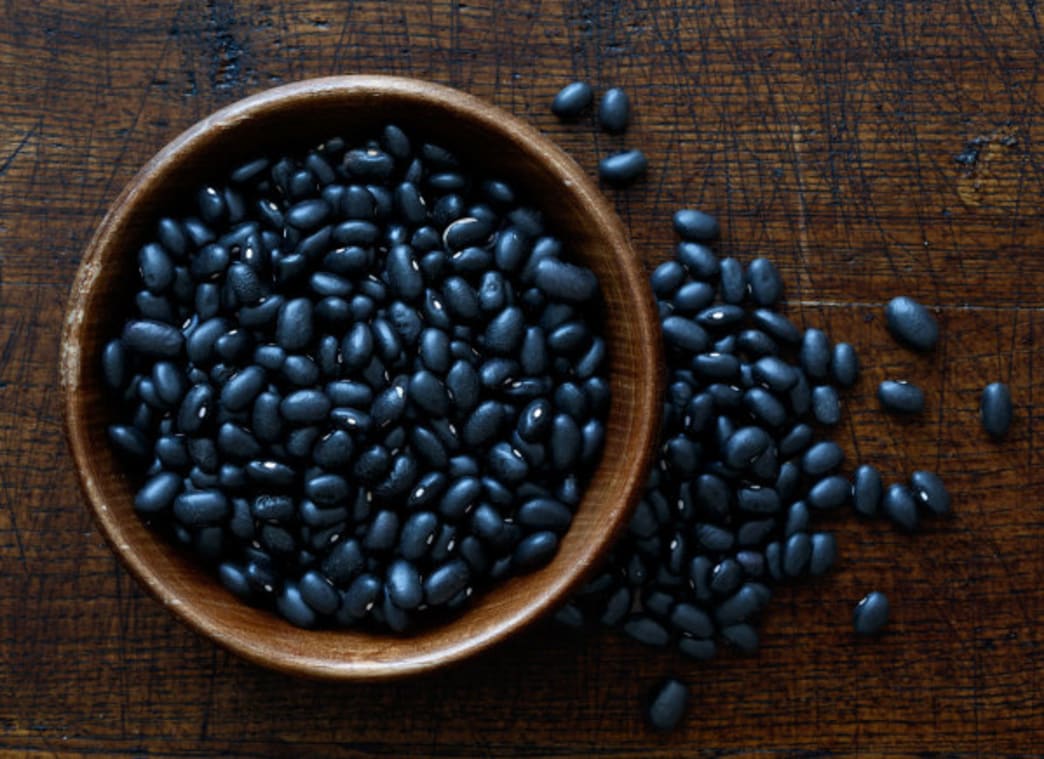
7 Foods for Stress Relief
Between visiting in-laws, family challenges, shopping frenzies, maxed-out credit cards, and just too many parties, the holidays can be a season of stress—not joy. This year, make your holidays happier: try these seven foods to calm your mind, support your body, and keep you celebrating until the New Year.
1. Black beans
Are rich in magnesium, a mineral that has a relaxing effect on the body and brain. Magnesium plays an important role in central nervous system (CNS) function, and studies have linked magnesium deficiency with stress. Other studies have linked a deficiency in this mineral to increased anxiety and levels of the stress hormones adrenaline and cortisol. Other high-magnesium foods include peanuts, almond butter, seeds and leafy greens.
Try this: cook black beans with onions, bell peppers, garlic, bay leaves, and vinegar for a traditional Cuban soup; toss cooked black beans with cubes of sweet potatoes and finely chopped kale, and drizzle with olive oil; make a Southwestern pizza—top pizza dough with black beans, corn, chopped red and green peppers, and cotija cheese.
2. Quinoa

Like other whole grains, is rich in B vitamins, which are critical for normal brain function, mood, and stress. Studies have linked the B vitamin thiamine to a significant improvement in anxiety levels, and B has been linked with improved mood. Vitamin B (pyridoxine) has a significant impact on production of serotonin and GABA, neurotransmitters that control anxiety. Other studies show increased intake of B vitamins improves mood and reduces stress—especially workplace stress, and anxiety and stress after a natural disaster. More good grains for B-vitamins: oats, barley, brown rice, amaranth, and buckwheat.
Try this: toss cooked red quinoa with chopped green beans, black olives, red peppers, and yellow corn for a colorful side; combine quinoa with sesame seeds and whole-grain flour to make a crunchy crust for fish; cook quinoa with white beans, collards, and acorn squash for a hearty stew.
3. Edamame (green soy beans)

Are rich in tryptophan, an amino acid that helps the brain produce serotonin and can have a calming effect. Studies have linked low dietary tryptophan with increased anxiety, stress, and aggressive behaviors. In one study, tryptophan significantly decreased argumentative behaviors and increased agreeable behaviors in both men and women. Other foods that are high in tryptophan include turkey, beef, cheese, and pumpkin seeds.
Try this: combine edamame, green peas, baby arugula, baby spinach, and avocado cubes for a striking, emerald green salad; toss edamame with sliced radishes, chicken or tofu cubes, and a spicy mayonnaise; purée edamame with tahini (sesame paste), garlic, lemon juice, and olive oil for a bright green hummus.
4. Pumpkin seeds

Are loaded with zinc, an important mineral that helps ease stress and anxiety. In one study, people who had anxiety and were diagnosed with zinc deficiencies took zinc supplements for eight weeks and reported significant reductions in anxiety. Others studies have shown that zinc levels are associated with GABA and glutamate, neurotransmitters that regulate anxiety and depression. Other foods high in zinc: oysters, beef, chicken, nuts, and adzuki beans.
Try this: make pumpkin-seed brittle—cook butter, brown sugar, and honey in a saucepan for 5–7 minutes, stir in pumpkin seeds, and pour onto parchment to cool; toss raw pumpkin seeds with olive oil, garlic salt, and cayenne pepper, and bake until golden; combine pumpkin seeds, cashews, and honey in a high-powered blender, and process into a creamy nut butter.
5. Chamomile tea

Is rich in a phenolic flavonoid called apigenin, which appears to be responsible for its relaxing effects. Other relaxing herbal blends include passionflower, lavender, and lemon balm.
Try this: simmer chamomile leaves in apple juice with nutmeg, a stick of cinnamon, and a slice of ginger for a warm, calming drink; mix cooled chamomile tea with lemon juice, honey, and sparkling water for a refreshing mocktail; mix loose chamomile flowers, lavender flowers, and dried lemon balm for a relaxing tea blend.
6. Chocolate

Contains a number of beneficial compounds including anandamide, a psychoactive feel-good neurotransmitter, and PEA (phenylethylamine), a natural substance that creates a sense of calm and euphoria. In one study, people who consumed 40 grams of milk or dark chocolate per day for two weeks reported less stress at the end of the study. Black truffles also contain anandamide, and high-protein plant foods—such as lentils, peas, peanuts, almonds, and flax—contain PEA.
Try this: make chocolate breakfast porridge—stir dark cocoa powder into cooked quinoa cereal or oatmeal, and top with coconut cream; chop dates, cacao nibs, cocoa powder, pistachios, and goji berries in a food processor, and form into colorful energy balls; make a quick mole—sauté onion and garlic in olive oil, add tomato purée, chipotle peppers, cocoa powder, and cumin, and simmer.
7. Kefir

A fermented dairy product, is one of the best sources of probiotics, which can improve gut bacteria and help modulate stress via the complex gut-brain axis, the signaling loop between the GI tract and the central nervous system. In one study, women who ate yogurt with probiotics showed reduced activity in areas of the brain that process stress. Kefir is also high in vitamin D, low levels of which have been linked with increased risk of panic and depression. And improving the gut flora in general can enhance the brain’s serotonin levels. Other foods with probiotics: coconut (dairy-free) kefir, yogurt, kimchi, sauerkraut, and miso.
Try this: purée vanilla kefir or coconut kefir with blueberries, hemp seeds, and frozen bananas for a creamy, protein-rich breakfast; combine unsweetened kefir with minced garlic, dill, lemon juice, and chives to make a savory ranch dressing; combine kefir, pumpkin purée, nutmeg, cinnamon, and ginger in a blender, purée until smooth, stir in pumpkin seeds or pumpkin brittle, then freeze for a pumpkin ice cream.
Written by Lisa Turner for Better Nutrition and legally licensed through the Matcha publisher network. Please direct all licensing questions to legal@getmatcha.com.
